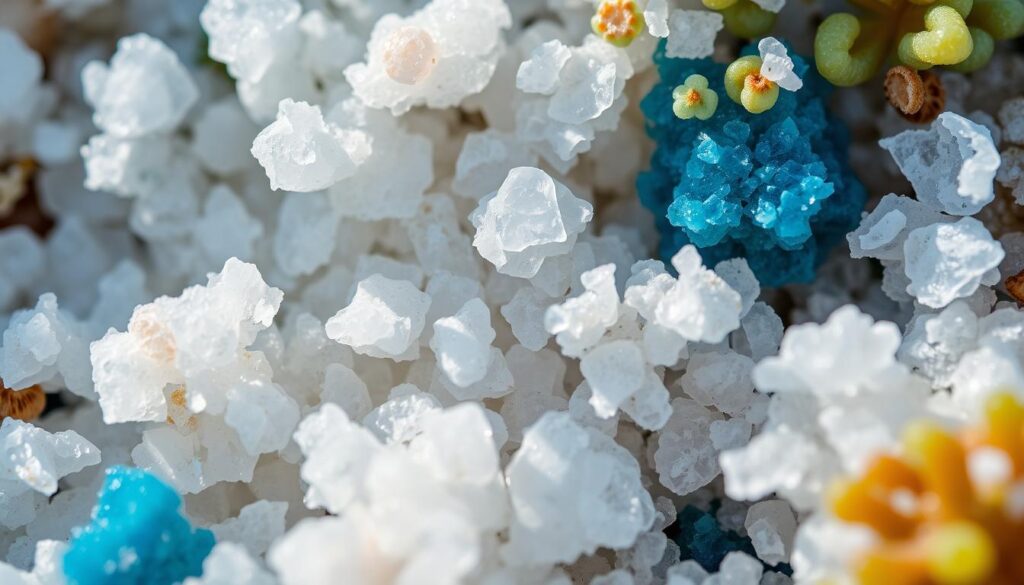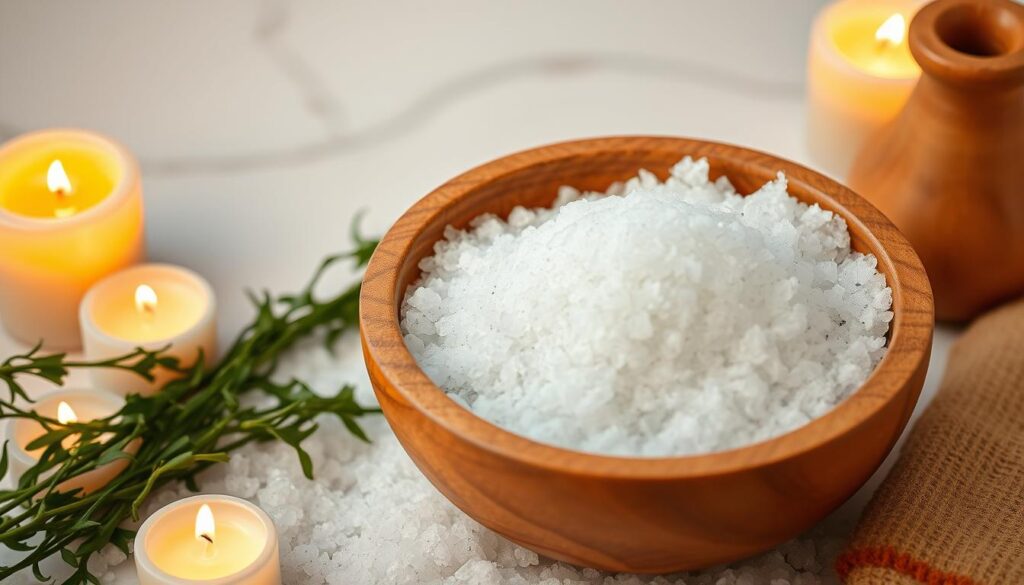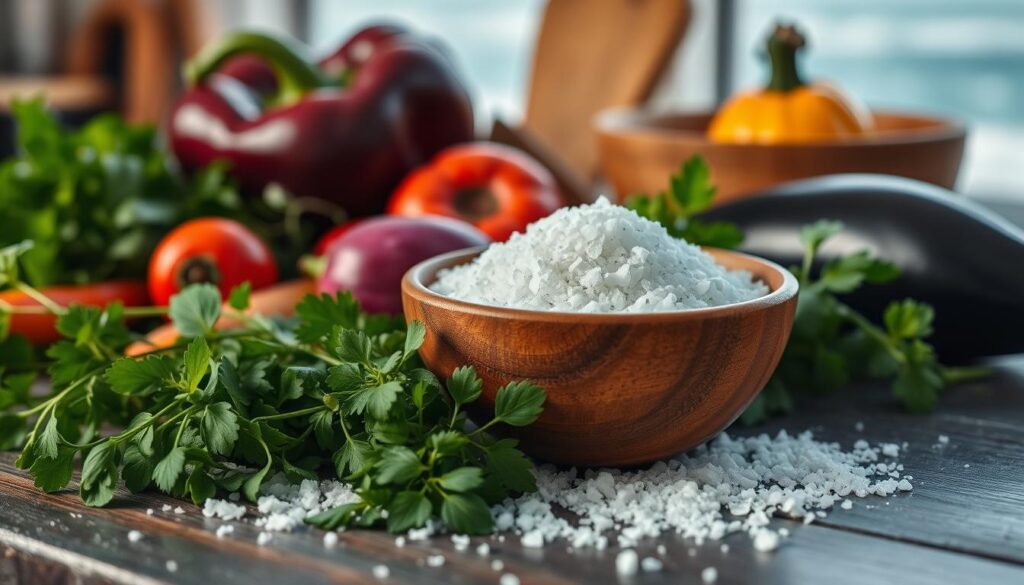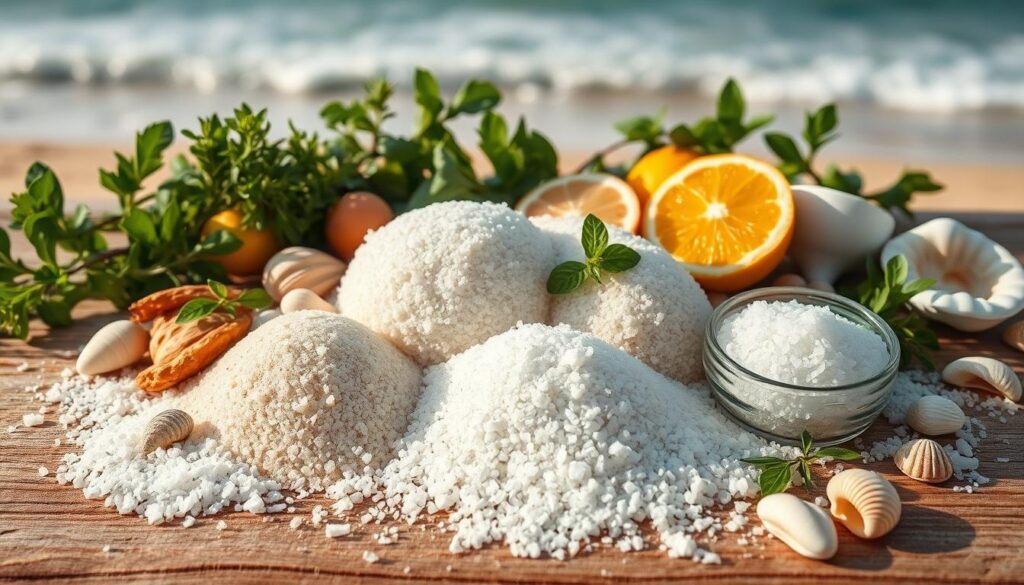In the ever-evolving world of health and wellness, the spotlight has increasingly turned to natural alternatives to processed foods and ingredients. One such standout is sea salt, a mineral-rich culinary and lifestyle essential that has gained considerable attention for its vast array of health benefits. As consumers become more conscious of the impact of their dietary choices, the quest for healthier salt options has sparked a growing interest in the remarkable properties of sea salt.
Sea salt, derived directly from the Earth’s oceans, offers a unique and complex flavor profile that sets it apart from its more refined counterpart, table salt. Beyond its distinct taste, sea salt is lauded for its remarkable health advantages, ranging from improved hydration and electrolyte balance to enhanced skin health and respiratory well-being. In this comprehensive exploration, we’ll delve into the captivating world of sea salt, uncovering the scientific evidence and practical applications that make it a must-have addition to any health-conscious lifestyle.
Key Takeaways
- Sea salt is a natural, minimally processed alternative to table salt, offering a wealth of essential minerals and health benefits.
- Compared to table salt, sea salt contains a more diverse array of trace minerals, including potassium, magnesium, and zinc, which play vital roles in the body.
- Incorporating sea salt into your diet can support optimal hydration, electrolyte balance, and skin health, while also providing potential benefits for respiratory and digestive function.
- Sea salt can enhance the flavor of your favorite dishes, making it a versatile ingredient in the kitchen that can elevate your culinary experiences.
- While sea salt offers numerous health advantages, it’s important to consume it in moderation as part of a balanced diet to avoid potential risks associated with excessive sodium intake.
What is Sea Salt?
Sea salt, a natural mineral-rich salt, is produced through the evaporation of seawater. Unlike refined table salt, which undergoes extensive processing, sea salt retains many of the essential minerals found in the original saltwater source. This unique composition contributes to the distinct taste and health benefits associated with incorporating sea salt into your diet.
Definition and Composition
Sea salt is the result of a natural evaporation process, where seawater is allowed to slowly evaporate, leaving behind the salt and other trace minerals. These minerals, such as potassium, iron, and zinc, contribute to the unique flavor and nutritional profile of sea salt. The composition of sea salt can vary depending on the location and method of production, but it generally contains a higher mineral content compared to table salt.
Differences Between Sea Salt and Table Salt
- Processing: Table salt undergoes extensive processing, including bleaching and the addition of anti-caking agents, to create a uniform, fine-grained product. In contrast, sea salt is minimally processed, retaining more of its natural trace minerals.
- Mineral Content: Sea salt contains a broader range of essential minerals, such as magnesium, calcium, and potassium, whereas table salt is primarily composed of sodium chloride.
- Taste: Sea salt typically has a more complex, nuanced flavor compared to the more neutral taste of table salt, which can be attributed to its diverse mineral composition.
When it comes to the types of sea salt, there are several varieties, including Himalayan pink salt, Fleur de Sel, and Sel Gris, each with its own unique characteristics and culinary applications.
Nutritional Value of Sea Salt
Sea salt is more than just a seasoning; it’s a rich source of essential minerals that can provide valuable health benefits. Unlike its processed counterpart, sea salt retains the natural trace elements found in seawater, making it a healthier alternative for those seeking to enhance their sea salt nutrition and sea salt minerals intake.
Essential Minerals Found in Sea Salt
Sea salt is a natural treasure trove of essential minerals, including:
- Magnesium: Crucial for muscle and nerve function, as well as energy production.
- Potassium: Helps maintain proper fluid balance and supports heart health.
- Calcium: Supports strong bones and teeth, and plays a role in muscle contraction.
- Iron: Necessary for the formation of red blood cells and the transportation of oxygen throughout the body.
- Zinc: Supports immune function and wound healing.
Healthier Alternatives to Processed Salt
While table salt is heavily processed and stripped of its natural minerals, sea salt offers a more wholesome alternative. By choosing sea salt over processed salt, you can enjoy a wider range of essential nutrients and support your overall health and well-being.
| Nutrient | Table Salt | Sea Salt |
|---|---|---|
| Sodium | 100% | 100% |
| Magnesium | 0% | 2-5% |
| Potassium | 0% | 2-4% |
| Calcium | 0% | 1-2% |
By incorporating sea salt into your diet, you can enjoy the benefits of these essential minerals while still satisfying your taste buds. It’s a simple yet effective way to support your overall health and well-being.

Hydration and Electrolyte Balance
The health benefits of sea salt extend beyond its savory flavor. One of the key advantages of incorporating sea salt into your diet is its role in maintaining proper hydration and electrolyte balance within the body.
Role of Sea Salt in Hydration
Sodium, a primary component of sea salt, plays a crucial part in regulating fluid levels in the body. It helps the body retain water, ensuring adequate hydration for optimal cellular function and overall well-being. By replenishing the body’s sodium stores, sea salt can counteract the effects of dehydration, particularly in individuals who are active or exposed to hot environments.
Sea Salt and Electrolyte Replenishment
In addition to its hydration benefits, sea salt is a natural source of essential electrolytes, such as potassium, magnesium, and calcium. These electrolytes are responsible for maintaining nerve and muscle function, regulating heart rhythm, and supporting overall bodily homeostasis. When engaged in physical activity or during periods of heavy sweating, sea salt can help replenish these vital electrolytes, aiding in recovery and preventing electrolyte imbalances.
| Electrolyte | Function | Sources |
|---|---|---|
| Sodium | Regulates fluid balance, nerve and muscle function | Sea salt, table salt, processed foods |
| Potassium | Maintains muscle and nerve function, regulates heart rhythm | Bananas, avocados, leafy greens, sea salt |
| Magnesium | Supports energy production, muscle and nerve function | Whole grains, nuts, seeds, sea salt |
| Calcium | Maintains bone health, muscle and nerve function | Dairy products, leafy greens, sea salt |
By incorporating sea salt into your diet, you can help ensure proper hydration and electrolyte balance, supporting overall health and well-being.
Skin Benefits of Sea Salt
When it comes to skin care, sea salt is a natural powerhouse that offers a wealth of benefits. From exfoliation to nourishment, this mineral-rich ingredient can work wonders for the health and appearance of your skin.
Exfoliation and Skin Renewal
The coarse texture of sea salt makes it an excellent natural exfoliator. When used in scrubs or baths, sea salt helps to slough off dead skin cells, revealing a fresh, radiant complexion. This process of exfoliation can stimulate skin renewal, promoting the growth of new, healthy cells.
Natural Remedies for Skin Conditions
Sea salt has long been used as a natural remedy for various skin conditions. Its anti-inflammatory and antimicrobial properties can help soothe and heal a range of issues, from acne and eczema to psoriasis and rosacea. A sea salt bath or compress can provide relief and promote healing for these common skin problems.
Whether you’re looking to exfoliate, rejuvenate, or soothe your skin, incorporating sea salt benefits for skin into your routine can be a game-changer. From sea salt baths to customized scrubs, the versatility of this natural ingredient makes it a must-have for anyone seeking healthier, more vibrant skin.

Sea Salt in Culinary Uses
Sea salt has become a staple ingredient in many kitchens, prized for its ability to enhance the natural flavors of food. Beyond its versatility, sea salt offers a range of health benefits that make it a preferred choice over traditional table salt. From enriching the taste of savory dishes to adding a unique twist to sweet treats, sea salt is a culinary essential that deserves a closer look.
Enhancing Flavor in Cooking
Sea salt’s distinct mineral-rich composition lends it a unique flavor profile that can elevate the taste of various dishes. Unlike table salt, which is heavily processed and stripped of its natural minerals, sea salt retains a more complex and nuanced flavor. When used in cooking, sea salt can bring out the inherent sweetness and depth of ingredients, creating a more harmonious and balanced taste experience.
Whether sprinkling it over roasted vegetables, incorporating it into marinades, or using it to season meats and seafood, sea salt can help accentuate the natural flavors of your culinary creations. Its coarse texture also provides a satisfying crunch that can add an extra layer of texture to your dishes.
Sea Salt Versus Other Seasonings
- Sea salt offers a more nuanced and complex flavor compared to table salt, which can be overpowering and lack depth.
- Unlike traditional salt, sea salt contains a variety of essential minerals, such as potassium, magnesium, and calcium, which can provide additional health benefits.
- When used in baking, sea salt can enhance the sweetness and balance the flavors in desserts and pastries, unlike table salt, which can mute the sweetness.
- Sea salt can be a versatile seasoning, complementing a wide range of ingredients and cuisine styles, from savory to sweet.
Incorporating sea salt into your cooking can be a simple way to elevate the overall taste and experience of your meals. Experiment with different varieties of sea salt, such as Himalayan or fleur de sel, to discover the unique flavors they can bring to your sea salt cooking and sea salt recipes.
Potential Health Benefits
Beyond its nutritional value, sea salt has been associated with various potential health benefits that extend into the realms of digestion and respiratory health. Exploring these lesser-known advantages can shed light on why incorporating sea salt into your lifestyle may be advantageous.
Digestion and Gastrointestinal Health
Sea salt’s mineral content can play a crucial role in supporting a healthy digestive system. The presence of trace minerals like magnesium and potassium in sea salt may help regulate gastrointestinal functions, potentially aiding in the management of conditions such as constipation, bloating, and acid reflux. Additionally, the unrefined nature of sea salt may contribute to better gut health by promoting a balanced gut microbiome.
Benefits for Respiratory Health
Interestingly, sea salt has been explored for its potential benefits in respiratory health. The inhalation of sea salt aerosols, a practice known as halotherapy or salt therapy, has been studied for its potential to alleviate symptoms associated with respiratory conditions like asthma, chronic bronchitis, and cystic fibrosis. The anti-inflammatory and mucolytic properties of sea salt may contribute to improved airway function and respiratory wellness.
| Potential Health Benefit | Mechanism of Action |
|---|---|
| Digestive and Gastrointestinal Health | Mineral content supports regulatory functions; unrefined nature promotes gut microbiome balance |
| Respiratory Health | Anti-inflammatory and mucolytic properties; potential benefits in conditions like asthma and chronic bronchitis |

“Sea salt’s unique mineral composition and natural qualities may unlock a range of potential health benefits beyond its essential nutritional value.”
While more research is needed to fully understand the extent of sea salt’s therapeutic applications, the available evidence suggests that this natural, unrefined salt may offer valuable health benefits for both digestive and respiratory well-being.
Sea Salt and Mental Well-Being
The humble sea salt, long revered for its culinary and skin-nourishing properties, is now gaining recognition for its potential to enhance mental well-being. Beyond its savory applications, sea salt can play a surprisingly versatile role in supporting our emotional and psychological health.
Impact on Stress Levels
One of the ways sea salt can contribute to better mental well-being is by helping to reduce stress levels. A soothing sea salt bath can have a calming effect, allowing the body and mind to unwind after a long, demanding day. The magnesium and other minerals found in sea salt are known to have a relaxing influence, promoting a sense of tranquility and balance.
Sea Salt in Aromatherapy
Another intriguing aspect of sea salt’s mental health benefits lies in its use in aromatherapy. When combined with essential oils, sea salt can create a captivating sensory experience that can uplift the mood and reduce feelings of anxiety. The crisp, refreshing aroma of sea salt-infused essential oils can have a profound effect on our emotional state, helping to alleviate stress and promote a sense of relaxation.
By incorporating sea salt benefits into our self-care routines, we can unlock a new dimension of mental well-being and find a natural way to nurture our overall health and happiness.

“The calming and rejuvenating properties of sea salt can have a profound impact on our mental well-being, helping us to find a state of tranquility and balance in our hectic lives.”
Precautions and Recommendations
While the sea salt health benefits and benefits of sea salt are numerous, it’s important to exercise moderation when incorporating this natural ingredient into your diet. Proper salt intake is essential for maintaining optimal health, and understanding the potential risks of excessive consumption can help you make informed choices.
Moderation in Salt Intake
The recommended daily intake of sodium, the primary component of salt, is typically around 2,300 milligrams per day for healthy adults. However, it’s important to note that individual needs may vary based on factors such as age, activity level, and underlying health conditions. To ensure you’re consuming sea salt in a balanced manner, consider the following guidelines:
- Aim for a maximum of 1 to 2 teaspoons of sea salt per day, adjusting as needed based on your overall dietary intake.
- Be mindful of your total salt intake from all sources, including processed foods, seasonings, and other dietary sources.
- Consult with your healthcare provider if you have any pre-existing medical conditions, such as high blood pressure or kidney disease, as they may recommend a more specific salt intake target.
Potential Risks of Excessive Consumption
While sea salt is generally considered a healthier alternative to processed table salt, it’s essential to be aware of the potential risks associated with excessive consumption. Overconsumption of salt, regardless of the source, can lead to:
- Elevated blood pressure: High sodium levels can contribute to the development or exacerbation of hypertension, increasing the risk of heart disease and stroke.
- Fluid retention: Excessive salt intake can cause the body to hold onto excess water, leading to swelling, bloating, and other related health issues.
- Kidney strain: The kidneys are responsible for regulating sodium levels in the body, and excessive intake can put a strain on their function, potentially leading to kidney disease or other complications.
By being mindful of your sea salt consumption and making it a part of a balanced, nutrient-rich diet, you can enjoy the sea salt health benefits while minimizing the potential risks associated with overconsumption.

Conclusion: Embrace the Benefits of Sea Salt
As we’ve explored, sea salt offers a wealth of health benefits that make it a versatile and valuable addition to any lifestyle. From delivering essential minerals to aiding in hydration and skin care, the advantages of incorporating sea salt into your daily routine are truly remarkable.
Summary of Key Health Benefits
Sea salt’s rich mineral content, including potassium, magnesium, and calcium, can help support overall well-being by regulating fluid balance, promoting healthy skin, and even contributing to improved respiratory function. Additionally, its use in culinary applications can enhance the flavor of your meals while providing a healthier alternative to processed table salt.
Incorporating Sea Salt into Your Lifestyle
To reap the full benefits of sea salt, it’s essential to strike a balance and consume it in moderation. Experiment with incorporating sea salt into your cooking, using it as a natural exfoliant, or even exploring its potential for stress relief through aromatherapy. By making sea salt a part of your holistic health approach, you can embrace its versatility and unlock a world of natural wellness.